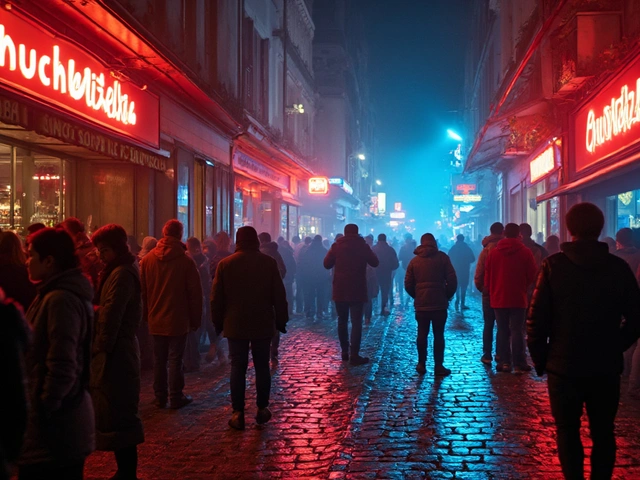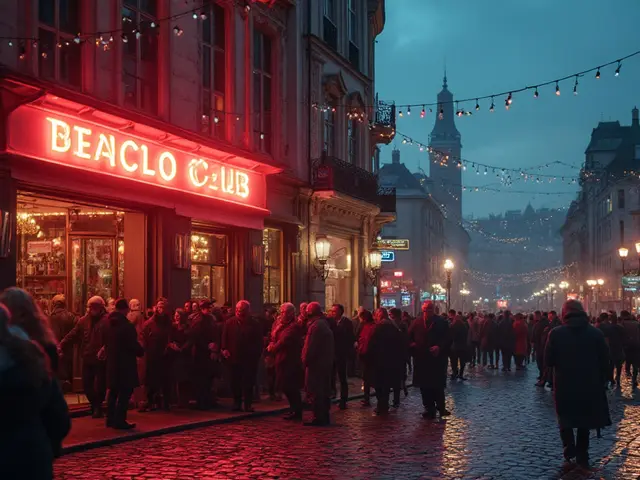It's almost impossible to stroll through the heart of Munich without seeing some trace of the city's icons. But out of all the homegrown stars, few have carved a path quite like Mia Julia. With her electrifying performances, wild energy, and grounded charm, she’s become a household name—not just in entertainment circles, but across mainstream German culture. Yet, what often flies under the radar is just how much her Munich roots have fueled her journey, shaping everything from her style to her attitude and relentless work ethic.
The Early Days: Growing Up Munich-Style
Mia Julia Brückner, born December 9, 1986, in Munich’s Pasing district, wasn’t raised in the glitz or chaos commonly linked to celebrity childhoods. Her story is both ordinary and remarkable—a typical Munich kid navigating bike rides along the Isar, afternoons at the Hofgarten, and the endless swirl of city bustle. She went to a regular comprehensive school, hung out with friends in Gärtnerplatz, and spent weekends at local open-air festivals instead of locked away in a music studio. Munich wasn’t just home. It was her playground, her canvas, and the basecamp for dreams that seemed way out of reach back then.
People often overlook how much this city shapes you. Ask anyone from Munich, and they’ll mention the strong sense of independence and tradition layered with street smarts and cosmopolitan tastes. Mia Julia soaked that all in. She’s hinted more than once in candid interviews that the “Munich mix”—equal parts hometown pride and worldliness—helped her both in handling media pressure and connecting with fans from every walk of life. She didn’t have blue-blooded showbiz connections, flashy mentors, or a family in the entertainment scene. Everything began with her own hustle, fostered by the hands-on attitude you find in any working-class Munich family.
Munich is a city that pushes you—but also cushions life's blows. There’s a particular rhythm to how its locals approach dreams and setbacks: try, fail, regroup, and try again. Mia Julia’s early setbacks—like endless applications, side jobs in bars, and auditions that seemed to go nowhere—didn’t break her spirit. If anything, they built a resilience that shows in every post, lyric, and candid conversation she shares. She credits those years with giving her thick skin. To this day, that raw honesty (sometimes clashing with tabloid curiosity) traces straight back to her Munich upbringing.
One detail her old school friends point out is how she never saw herself as a future celebrity. She wanted adventure, sure, but never the Cinderella narrative. She was that girl singing at casual parties, hyping up friends during local football games, and showing up to every event with the loudest laugh in the room. That Munich authenticity—never faked, never forced—stayed with her long after fame found her.
Building a Career: The Munich Momentum
The leap from Munich “girl next door” to pop sensation wasn’t a straight line. Mia Julia found her early fame in adult entertainment, a choice that sparked controversy, fueled gossip columns, and tested her grit. Critics in Munich media often wondered if she’d ever shake that image, but she flipped the narrative. Rather than run from her beginnings, she brought the same honest, unpretentious spirit to a new chapter: singing. In 2012, her breakthrough came almost by accident. She stepped onto the stage at Ballermann in Mallorca—Germany’s party mecca—for what was supposed to be a short gig. But the crowd went wild, drawn by the same down-to-earth charisma Munich locals knew so well.
Her early performances weren’t polished—they were pure adrenaline, packed with 100% energy and a touch of the wild unpredictability you find at Munich’s Oktoberfest. That’s not a coincidence. Anyone who’s ever partied in Munich knows there’s a unique chemistry in the air: people living in the moment, ditching pretense, singing at the top of their lungs. Mia Julia’s shows captured that in spades. Her first hit single “Mallorca, da bin ich daheim” reached the charts and blasted her into a new orbit, as both her Munich following and partygoers in Spain rallied behind her.
It’s easy to think a pop career is all glitz, but Mia Julia grafted hard. She braved 250+ shows a year, bouncing between Munich, Mallorca, and every club scene in between. She rehearsed incessantly, balanced social media growth, and built a team from scratch—often relying on close friends from her Munich days. Everything was DIY, from costume design to managing feuds with promoters. If something went wrong, she’d fall back on her hometown instincts: sort it in person, keep it real, don’t make excuses.
Insiders from the Munich live music scene still credit her with breaking down doors for new talent. If you meet an ambitious singer in Munich now, odds are they’ll mention Mia Julia as the proof it’s possible to go from beer garden gigs to mainstream stardom. Her style—equal parts Bavarian warmth and no-filter honesty—cuts through the standard “pop star” script. She often launches fan Q&As in local dialect, and even her music videos drop subtle Munich “Easter eggs”: a quick skyline shot here, a cameo from a childhood friend there.
That sense of loyalty hasn’t gone unnoticed. Mia Julia’s team is stacked with people from her early days: her first stage tech, her longtime friend who now handles her publicity, her cousin who helps with merchandise design. She never lost touch with those roots, no matter how far she traveled. And fans? They sense it. Her social media posts—peppered with memories of Munich’s Englischer Garten or late-night kebabs after gigs—remind everyone she’s never forgotten where she came from.
Newcomers to her story might be surprised by how fiercely Munich supports “their” star. Local radio stations frequently play her singles, fan groups organize charity runs in her name, and even the annual Fasching (carnival) parades have spotted Mia Julia lookalikes. It’s a cyclical kind of fame—she repays hometown loyalty with endless energy, and the city keeps cheering her on.
Mia Julia’s Munich: Beyond the Stage
Mia Julia’s success didn’t just give her a bigger spotlight—it turned her into something like a Munich ambassador. She’s spoken about how Munich’s nightlife scene, from cozy bars in Schwabing to the riotous crowds at Tollwood Festival, inspired her understanding of what fans actually want. She learned early which songs got a room jumping and which moments called for something real and stripped-back. Those instincts still guide her today. She can read a crowd faster than most DJs, and she credits those skills to years spent in the electric, unpredictable thrum of Munich’s after-hours life.
But her connection to the city isn’t just about parties. Mia Julia regularly backs local charities, supports urban art projects, and has donated signed memorabilia for fundraising auctions around Munich. She’s a fixture at neighborhood events—showing up to sign autographs at youth centers, drop off cupcakes at school fairs, even posing for photos at the office Christmas markets. Sometimes fame swings open doors; other times, her roots mean more. Teachers, city workers, and community organizers see her as “one of ours” first, and she leans into that trust. It’s not a PR thing. To her, it’s just what you do when Munich raised you.
The city also keeps her grounded. Mia Julia says her creative process is still tied to local haunts: she writes lyrics in cozy cafes on Sendlinger Straße, and her favorite photo shoots happen along the old train tracks near Haar. Her team tries to block out time for her to recharge in the city every few months, no matter how hectic her touring schedule gets. She claims nothing fixes creative burnout like a lazy afternoon wandering Viktualienmarkt or people-watching from the steps of the Bayerische Staatsoper. In interviews, she jokes she’ll always be “the loudest in the beer tent”—whether she’s performing for 15,000 fans on Mallorca or just singing along with friends at a corner pub in Munich.
Plenty of stars use their hometown as a branding tool, but for Mia Julia, it’s real. Her lyrics drop Munich references, her merch collabs benefit city youth groups, and she’s quick to clap back at anyone who stereotypes her city. She’s also helped change Munich’s cultural image abroad—from staid tradition to inclusive party capital—by showing how everyday people there can become icons with enough nerve.
For fans hoping to get closer to the real Mia Julia vibe, there’s a simple set of tips for soaking up her Munich: check out her favorite music venues (look up Gasteig or Backstage if you’re into live gigs), drop by the Isar riverbanks for spontaneous pop-up parties, or try grabbing a snack at one of her much-loved local bakeries. You’ll pick up the same lighthearted energy and



